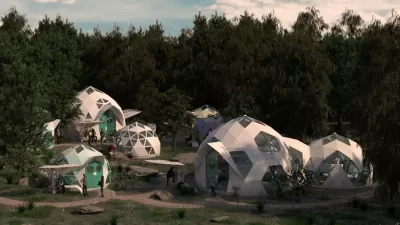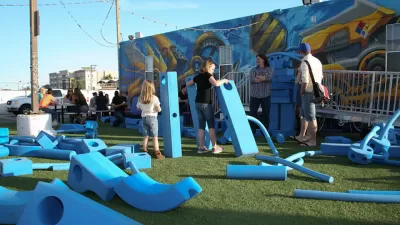Zappos, a shoe company, is working with Geoship, a geodesic dome company, to build a village of the domes in Las Vegas.

Adele Peters reports on the expanding project of a startup called Geoship, "which is using the material to build new dwellings in the form of a geodesic dome and has plans to produce both backyard cottages and full communities."
Geoship recently road a wave of news coverage when it partnered with shoe company Zappos, infamous in urbanism circles for its efforts to remodel Downtown Las Vegas in its own image, on a plan to build a village of geodesic domes in Las Vegas. Peters explains:
[Geoship] caught the attention of Zappos and is working with the company to build a small “village” of the domes in Las Vegas near the online shoe retailer headquarters. The plan is to offer them as free housing for some of the many people who are experiencing homelessness in the city.
A key feature of Geoship's business model is the bioceramic material used to build the domes:
The ceramic is fireproof up to 2,700 degrees Fahrenheit; in a fire, the house won’t burn. It reflects more than 80% of the heat from the sun, helping keep the inside cool in heat waves. The material is strong, and in combination with the inherent strength of the dome shape, should be able to survive hurricanes. It resists insects and mold. In a flood, it absorbs little water. In an earthquake, because of the building’s shape and the way that the panels chemically bond together, the house should stay standing.
All of those benefits and more are possible at 40 percent of the normal construction costs for a house of similar square footage, according to the company's claims.
Geoship is the latest company with connections to a big name to attempt disruption of the housing construction industry. Last week it was Kanye West.
FULL STORY: Are these fireproof, hurricane-proof geodesic domes the post-climate change house of the future?

Alabama: Trump Terminates Settlements for Black Communities Harmed By Raw Sewage
Trump deemed the landmark civil rights agreement “illegal DEI and environmental justice policy.”

Planetizen Federal Action Tracker
A weekly monitor of how Trump’s orders and actions are impacting planners and planning in America.

Why Should We Subsidize Public Transportation?
Many public transit agencies face financial stress due to rising costs, declining fare revenue, and declining subsidies. Transit advocates must provide a strong business case for increasing public transit funding.

Understanding Road Diets
An explainer from Momentum highlights the advantages of reducing vehicle lanes in favor of more bike, transit, and pedestrian infrastructure.

New California Law Regulates Warehouse Pollution
A new law tightens building and emissions regulations for large distribution warehouses to mitigate air pollution and traffic in surrounding communities.

Phoenix Announces Opening Date for Light Rail Extension
The South Central extension will connect South Phoenix to downtown and other major hubs starting on June 7.
Urban Design for Planners 1: Software Tools
This six-course series explores essential urban design concepts using open source software and equips planners with the tools they need to participate fully in the urban design process.
Planning for Universal Design
Learn the tools for implementing Universal Design in planning regulations.
Caltrans
Smith Gee Studio
Institute for Housing and Urban Development Studies (IHS)
City of Grandview
Harvard GSD Executive Education
Toledo-Lucas County Plan Commissions
Salt Lake City
NYU Wagner Graduate School of Public Service



























